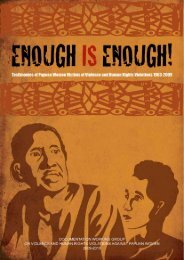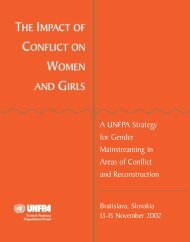Sexual exploitation and abuse by UN peacekeepers - PeaceWomen
Sexual exploitation and abuse by UN peacekeepers - PeaceWomen
Sexual exploitation and abuse by UN peacekeepers - PeaceWomen
You also want an ePaper? Increase the reach of your titles
YUMPU automatically turns print PDFs into web optimized ePapers that Google loves.
48<br />
Carlyn van der Mark<br />
Political Science Master Thesis - <strong>Sexual</strong> <strong>exploitation</strong> <strong>and</strong> <strong>UN</strong> <strong>peacekeepers</strong><br />
Hypothesis III argues that if more emphasis is placed on resource allocation then there would<br />
be fewer allegations of sexual <strong>exploitation</strong> <strong>and</strong> <strong>abuse</strong>. However, due to the limits of this<br />
thesis, this hypothesis cannot be fully tested. This is because there is no case where<strong>by</strong><br />
resource allocation is highlighted. This section of the thesis indicates the problem of the zero<br />
tolerance in acknowledging this variable which is why it is used as a failure of the zero<br />
tolerance policy. The difficulty with peacekeeping missions is that they are limited in their<br />
involvement with domestic governance. If the zero tolerance policy were to effectively<br />
recognize the domestic context, then more collaboration with governmental forces are needed<br />
to prevent sexual <strong>exploitation</strong> <strong>and</strong> <strong>abuse</strong>. Collaboration with governments could be taken in<br />
the form of more awareness raising campaigns. This would be a better solution as a<br />
prevention strategy then providing recreational facilities for <strong>peacekeepers</strong>.<br />
Section 4: Conclusion<br />
This thesis has attempted to discover which factors explain for the failure of the U.N‟s zero<br />
tolerance policy towards sexual <strong>exploitation</strong>. Section 1 established that the main peacekeeper<br />
that is involved with allegations of sexual <strong>exploitation</strong> <strong>and</strong> <strong>abuse</strong> are the military troops. The<br />
reason for military troop‟s involvement with sexual <strong>exploitation</strong> <strong>and</strong> <strong>abuse</strong> can be explained<br />
<strong>by</strong> using the masculinities argument. This thesis has focused on the social masculinities<br />
argument, indicating that the social environment exacerbates allegations of sexual<br />
<strong>exploitation</strong> <strong>and</strong> <strong>abuse</strong>. A peacekeeping mission is set in a domestic context with no stable<br />
government. This makes the role of the peacekeeper even more important in providing<br />
support <strong>and</strong> peace to the local population, opposed to abusing their position, <strong>and</strong> helping to<br />
reinforce a dem<strong>and</strong> <strong>and</strong> supply cycle of sex. The social masculinities argument is largely<br />
ignored <strong>by</strong> the U.N‟s zero tolerance policy. The zero tolerance policy follows an essentialist<br />
perception in combating sexual <strong>exploitation</strong>. The U.N assumes that with the inclusion of<br />
more women in peacekeeping operations, there will be fewer allegations of sexual<br />
<strong>exploitation</strong> <strong>and</strong> <strong>abuse</strong>. This strategy is not only flawed <strong>and</strong> was shown in tables 3 <strong>and</strong> 4 to<br />
not have a large impact, but the strategy reinforces the essentialist argument that women are<br />
peaceful <strong>and</strong> men are violent. This argument is an overtly simplified explanation to include<br />
more women into peacekeeping missions that exclude the importance of social structures <strong>and</strong><br />
norms that influence behavioral patterns. The zero tolerance policy of including more women<br />
into peacekeeping missions will not be the answer in preventing future allegations of sexual<br />
<strong>exploitation</strong>. It should be recognized that this thesis is not against the inclusion of more




![IANSA [PDF, 2MB] - PeaceWomen](https://img.yumpu.com/25206379/1/190x123/iansa-pdf-2mb-peacewomen.jpg?quality=85)
![Commitments Sample [PDF, 93KB] - PeaceWomen](https://img.yumpu.com/25206331/1/190x245/commitments-sample-pdf-93kb-peacewomen.jpg?quality=85)










![A Toolkit for Advocacy and Action [PDF, 260KB] - Peace Women](https://img.yumpu.com/25205989/1/190x245/a-toolkit-for-advocacy-and-action-pdf-260kb-peace-women.jpg?quality=85)